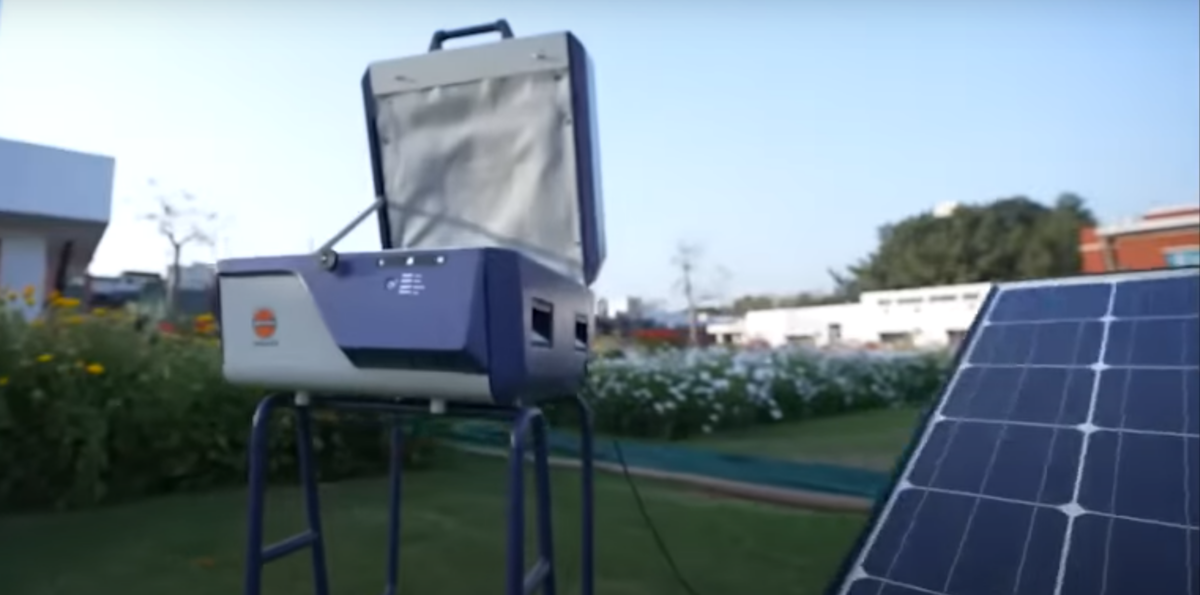In many rural communities, traditional cooking methods rely heavily on biomass fuels such as wood, coal, and kerosene. These traditional cooking methods do more than provide warmth and sustenance. They silently poison the air inside homes, trapping families in a literal toxic cycle of smoke and suppression. With every meal prepared over an open flame, lungs are scarred, the environment suffers, and generations unknowingly pay the price for a practice long overdue for change.
The World Health Organization estimates that around 2.6 billion people globally still cook using polluting open fires or simple stoves, leading to severe respiratory diseases and premature deaths. In response to the health and environmental toll of traditional cooking methods, solar-powered alternatives are revolutionising rural kitchens. These innovative solutions eliminate harmful smoke, reduce deforestation, and cut fuel costs, offering a transformative path to cleaner air, healthier lives, and a more sustainable future for underserved communities.
The promise of solar cooking solutions
Solar cooking technologies utilise the sun’s abundant energy to prepare meals, removing the reliance on traditional fuels like wood, coal, and kerosene. This transition significantly cuts down deforestation, curbing environmental degradation while reducing greenhouse gas emissions. By eliminating smoke-filled kitchens, these solutions also address the severe health risks linked to indoor air pollution, which is a major cause of respiratory illnesses in rural communities.
Beyond environmental and health benefits, solar cooking provides financial relief to low-income households. Many families in developing regions spend a substantial portion of their income on cooking fuels or spend hours collecting firewood, a task often carried out by women and children. With solar alternatives, these burdens are lifted, freeing up time and resources for education, economic activities, and better living conditions. As a result, solar cooking solutions are not just technological advancements but transformative tools for sustainability, health, and economic empowerment.
Innovative initiatives leading the way
In the push for cleaner, more sustainable cooking solutions, several groundbreaking initiatives are transforming the way millions prepare their meals. One of the most significant advancements is the ‘Surya Nutan’ indoor solar cooking system, developed by the Indian Oil Corporation Ltd (IOCL). Unlike traditional solar cookers that rely solely on direct sunlight, ‘Surya Nutan’ is a stationary, rechargeable system that integrates solar photovoltaic technology with thermal storage and grid power. This ensures a 24/7 cooking solution, making it a reliable alternative even during cloudy days or nighttime cooking.
It supports a variety of cooking methods, including boiling, steaming, frying, and baking. This is going to prove practical for switching to these solutions from mudstoves; a challenge that earlier improved cookstove models faced, i.e., adaptation.
EKI has been actively promoting sustainable cooking solutions since 2018. Through its climate finance-funded initiative, EKI has introduced clean cooking practices to over two million tribal and underprivileged households across India and Africa. The programme primarily focuses on distributing improved cookstoves, which significantly reduce the need for firewood and other biomass fuels. By doing so, it not only lowers household expenses but also helps curb deforestation and environmental degradation.
These efficient cookstoves ease the burden of fuel collection, a responsibility often placed on women and children, freeing up their time for education and income-generating activities.
With such innovative solutions leading the way, clean cooking is no longer a luxury but an achievable reality for millions in rural and underserved communities.
Empowering communities and advancing sustainability
The impact of these solar cooking solutions extends beyond environmental and health benefits. By providing accessible and affordable clean cooking technologies, these initiatives empower rural communities, enhance quality of life, and contribute to sustainable development goals.
In many rural communities, the responsibility of gathering firewood falls on women and young girls, preventing them from attending school or participating in economic opportunities. With clean cooking solutions in place, they can redirect their time towards learning, entrepreneurship, and community engagement. This shift not only empowers individuals but also strengthens local economies, fostering long-term development, reducing gender disparities, and creating a more sustainable and prosperous future for entire communities.
The integration of solar cooking solutions like ‘Surya Nutan’ into rural settings signifies a pivotal move towards sustainability and improved public health. Through collaborative efforts and innovative technologies, these initiatives are transforming lives, protecting the environment, and paving the way for a cleaner, healthier future for rural communities worldwide.
The views and opinions expressed in this article are the author’s own, and do not necessarily reflect those held by pv magazine.
This content is protected by copyright and may not be reused. If you want to cooperate with us and would like to reuse some of our content, please contact: editors@pv-magazine.com.








By submitting this form you agree to pv magazine using your data for the purposes of publishing your comment.
Your personal data will only be disclosed or otherwise transmitted to third parties for the purposes of spam filtering or if this is necessary for technical maintenance of the website. Any other transfer to third parties will not take place unless this is justified on the basis of applicable data protection regulations or if pv magazine is legally obliged to do so.
You may revoke this consent at any time with effect for the future, in which case your personal data will be deleted immediately. Otherwise, your data will be deleted if pv magazine has processed your request or the purpose of data storage is fulfilled.
Further information on data privacy can be found in our Data Protection Policy.